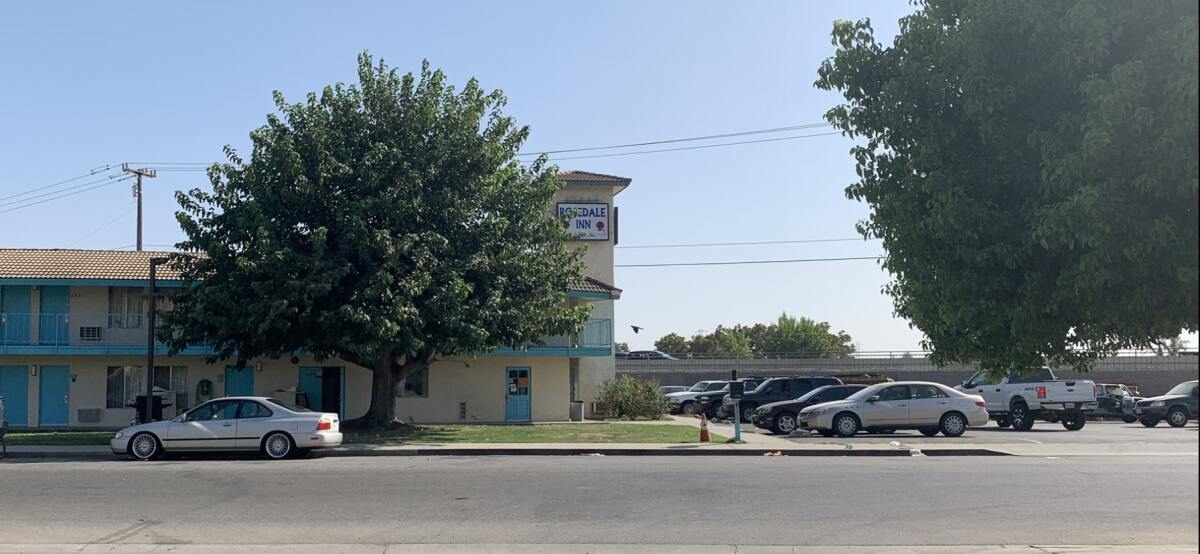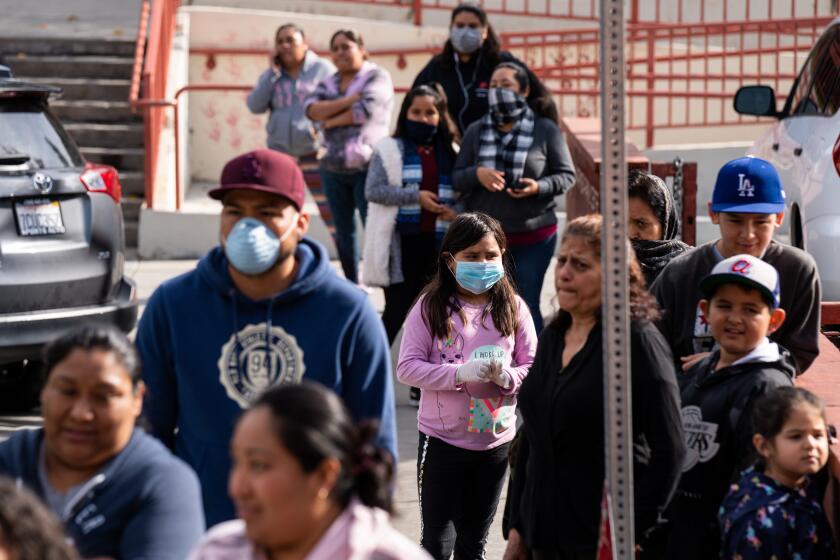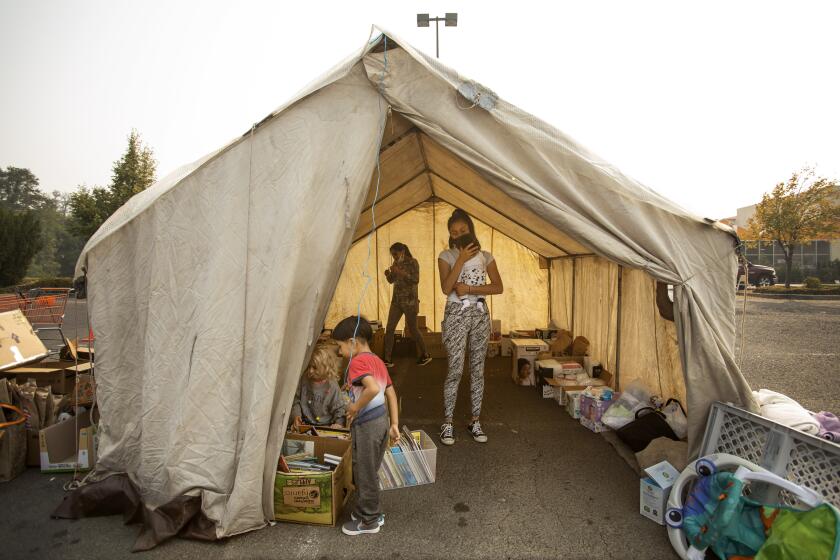Column: She tried to rent motel rooms for homeless people. A NIMBY hospital stopped her

- Share via
BAKERSFIELD — There is no shortage of excuses in California about why we continue to let tens of thousands of people live — and often die — in filthy encampments on street corners, in alleys and under freeways year after year.
Anna Laven expected to hear them when she agreed to become the first executive director of the Bakersfield-Kern Regional Homeless Collaborative.
What she didn’t expect was to hear them from a doctor in charge of a hospital. Much less during a pandemic and a wildfire season so destructive that it has raised serious concerns about homeless people spending too much time outside breathing in smoke.
“I’m not gonna lie,” Laven told me, her voice growing incredulous. “That threw us for a loop.”
Indeed, what has gone down in Kern County this year, culminating in a particularly dispiriting Bakersfield City Council meeting this month, is so ridiculous on its face that it’s almost laughable. But it’s serious business that, to a lesser degree, has been replicated all over the state.
Some cities and counties have failed to get quite as many homeless people into hotels and motels as they had promised when the panic over COVID-19 was new. And questions remain about solving the larger homelessness crisis, even as the state has started awarding hundreds of millions of dollars to purchase and convert hotels, motels and empty apartment buildings into permanent homeless housing.
In Los Angeles, for example, the goal was to get 15,000 people off the streets, but so far, the number is closer to 4,000.
In San Francisco, homeless people and their tents continue to dot the streets, only now they are sleeping amid diners sitting at tables plopped on sidewalks and in the streets. In Sacramento, people sleep in parked cars even in middle-class neighborhoods, and encampments now choke overpasses where there were once only a few tents.
What happened in Bakersfield sets the bar even lower than that — which is saying something, because the bar there was already pretty low.
A year ago, the going solution for getting people off the streets was to lock more of them up for trespassing and misdemeanor drug charges. Unsurprisingly for the conservative Central Valley, Sheriff Donny Youngblood and Dist. Atty. Cynthia Zimmer were the architects of this cockamamie and legally dubious plan.
“The transient population, it’s just so sad and it’s so pitiful, and you sound like you’re so mean,” Zimmer told my colleague Julia Wick, presumably with a straight face. “To be safe, we’ve got to put some of these people in jail.”
Yeah, no.
New survey finds three-fourths of families have experienced a loss of income since March and more than one-third of students don’t have a quiet place to study.
Fast-forward a few weeks. Still reeling from the spike in homelessness and anticipating yet another one in 2020, officials with Kern County and Bakersfield, where the vast majority of the county’s nearly 1,600 homeless people live, agreed to turn the Homeless Collaborative into an official nonprofit in charge of developing an actual strategy.
Laven started as executive director in early February, shortly before the economy shut down because of COVID-19.
Within weeks, Gov. Gavin Newsom was pushing Project Roomkey, the government-funded initiative that counties have used to get the most medically vulnerable homeless people into hotel or motel rooms so they won’t contract the novel coronavirus, get sick and overwhelm hospitals.
Kern County, in many ways, was starting from scratch, unlike L.A. County, for example, with its robust homeless-industrial complex of service providers and shelters.
Rather than looking for rooms to rent right away, Laven’s team started with 15 state-owned RVs to use for homeless people who had tested positive or were waiting on test results. Then the focus shifted toward prevention and finding hotels for 226 people who were 65 or older and who had chronic health conditions, such as diabetes — the criteria for Project Roomkey.
The first few attempts to rent hotels and motels never got off the ground, largely because neighbors complained before anyone was even placed.
Then the nonprofit found the Rosedale Inn. Just off Highway 99, the aging, two-story motel is across from an IHOP, a gas station, a couple of fast-food joints and the Kern River. There are no houses or apartment complexes nearby. In other words, it was perfect — or so Laven thought.
Bakersfield’s Board of Zoning Adjustment approved the Homeless Collaborative’s request to rent 20 rooms with a unanimous vote, leaving only approval from the full City Council as the next step. But then came the appeal from Bakersfield Heart Hospital, which has an employee parking lot just up the road from the Rosedale Inn.
In a letter to council members, Sparks Law Firm, hired by the hospital, insisted that renting rooms to homeless people would increase vandalism and theft in the area, and could lead to patients and employees being exposed to COVID-19.
At a council meeting, Dr. Brijesh Bhambi, who is the chairman of the hospital’s board, explained that he had no problem with Project Roomkey, in general, but he just didn’t want it operating at the Rosedale Inn. “Vandalism will worsen and patient care will suffer,” he said, adding, “It’s a simple matter of workplace safety.”
Jerry Sparks, a managing partner at Sparks Law Firm, reiterated that the problem is the Rosedale Inn is “inappropriate.”
“It’s not going to help, it’s going to hurt,” he said. “It is even more dangerous to the participants of this program to be placed in an environment where there are drug users. One can go out there and you can see them. I’ve seen them myself. There are parolees and criminals who are dropped off at that location. It is not an appropriate environment.”
For sure, the Rosedale Inn is definitely a motel of last resort.
Oregon wildfires leave California transplants homeless and facing rising housing costs.
Over the weekend, I went to check it out. Some guests had hung wet laundry over the turquoise railings to dry in the Central Valley heat. A kid was swinging from a swing made out of a blanket and rope tied around the branch of a tree. The street is lined with trash and battered cars, many with shattered windows and some with people sleeping inside.
The parking lots of the surrounding businesses weren’t much better. No one was interested in talking.
Laven and her Homeless Collaborative offered to clean up the Rosedale Inn and provide overnight security in addition to attendants during the day. Still no luck. The Bakersfield City Council rejected the project.
It’s unclear what will come next. Perhaps sending the most vulnerable homeless people back to state-owned RVs, which is a challenge for those with physical disabilities. Some on the council suggested moving them to a still under construction homeless navigation center. Laven has all but given up on finding a motel to rent. A few have already died of COVID-19 while waiting for rooms, and another wave of illness and death could arrive by fall.
If you can’t put the most vulnerable homeless people in a motel alongside a freeway in a not-so-great neighborhood, where can you put them? Probably, not in a fancy hotel in a wealthy neighborhood either.
All I know is, the answer can’t keep being nowhere.
More to Read
Sign up for Essential California
The most important California stories and recommendations in your inbox every morning.
You may occasionally receive promotional content from the Los Angeles Times.









